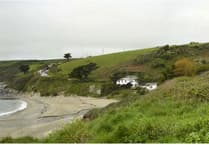ON July 1, 1916, on the first day of the Battle of the Somme, Private Arthur Bowles of the 9th Battalion Devonshire Regiment was killed in action at Mansel Copse near the village of Mametz. Together with 160 of his colleagues, Arthur was buried in a section of the front line trench, which was to become known as the Devonshire Cemetery.
Arthur’s name is engraved on the war memorial in the small Devon village of Bratton Clovelly and is read out each year at the annual Remembrance Day service.
Successive generations have passed the memorial in the village square and heard his name, but what does anyone really know about the history of all of those young men who gave their lives 100 years ago?
As a result of the Heritage Lottery Funded, First World War ‘Then and Now’ project, Red Spider Amateur Dramatic Company has had the opportunity to find out about Arthur and several other young men who died on July 1, 1916, and share their stories with the local community.
A spoksperson said: “We have been incredibly fortunate to work with Mary Jordan, former post mistress of Bratton Clovelly post office, who has in her possession an amazing collection of letters, photographs and other memorabilia that belonged to her aunt, Edith Palmer: Edith was engaged to Arthur Bowles.”
The details of their love story feature in a touring exhibition, curated by members of the local community who have researched the history behind the names of the young men and their communities.
With advice and expertise from Lawrence House Museum in Launceston and with the support of the local history groups, volunteers have had the opportunity to develop new skills and put together an exhibition that acknowledges the part played by the people from West Devon in the First World War.
The archive also includes details about Mary’s uncle, Nicolas Palmer who was a rural postman and contemporary of Arthur Bowles. Growing up in the same village the boys attended the small rural school and got to know one another and each other’s families. Sadly, Nicholas was to die a year later and is buried in Tyne Cot Cemetery. His name can be read on the memorial in the village square. Mary’s father Frank Palmer served with the Egyptian Expeditionary Force and fortunately survived to return home at the end of the war.
The exhibition will take place at Lewdown Victory Hall on Saturday, July 9, from 10am to 3pm, and the play ‘All The Fine Young Men’ will take place at Lewdown Victory Hall, from July 14 to 16. Details about the exhibition and musical drama can be found on the website www.atfym.co.uk, the Tourist Information Centre, Launceston, or the RSC website: www.redspidercompany.co.uk




Comments
This article has no comments yet. Be the first to leave a comment.